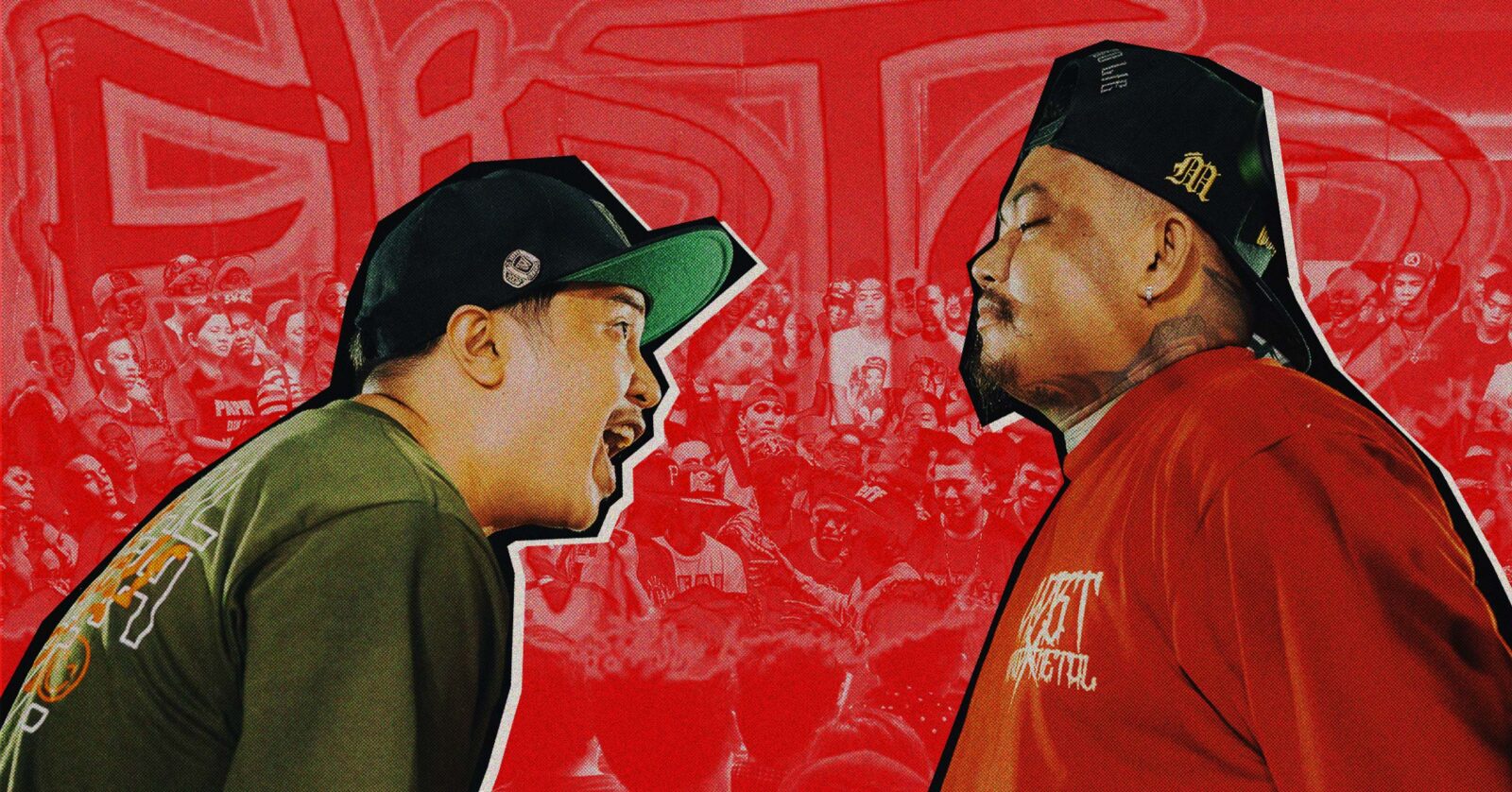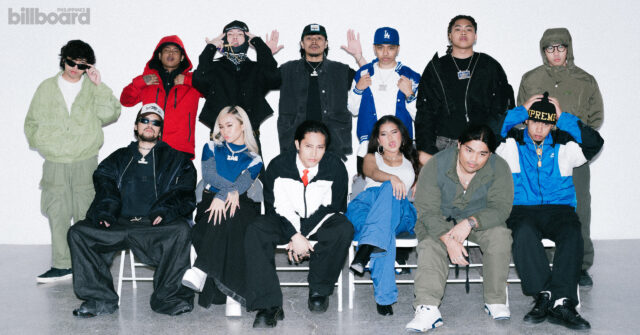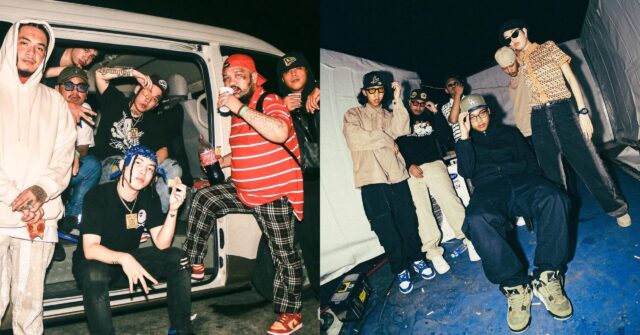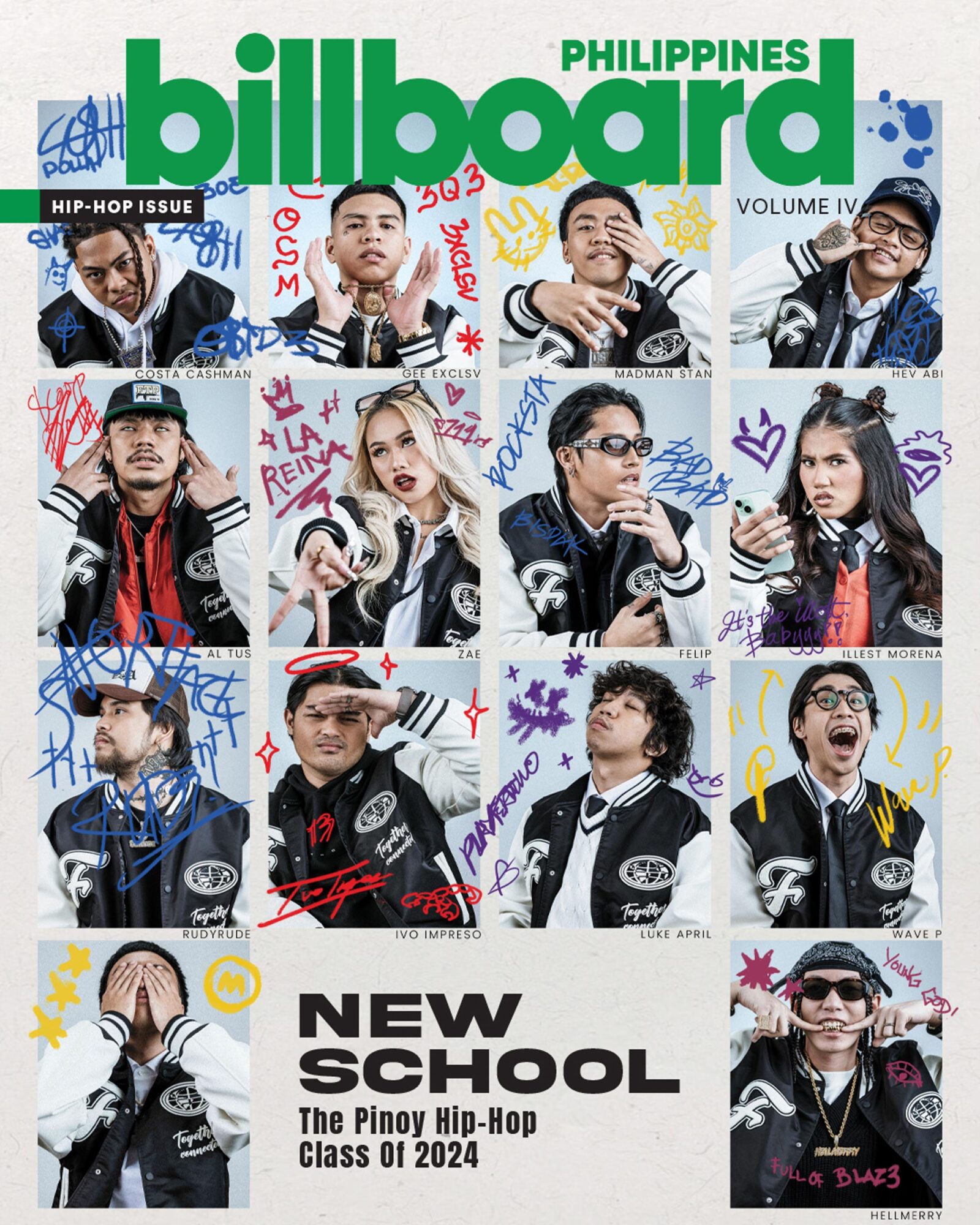“FlipTop, mag-ingay [make some noise!]”
The people erupt in cheers. The energy is electric, the audience shoulder-to-shoulder as they crowd around the elevated stage of B-Side, 88Fryer, Makati Cinema Square, or anywhere else in the country. What follows next is a flurry of poetry, clever wit, punchline humor, and the fiery passion that has come to define its battles.
You don’t get a legacy like that without becoming a cultural phenomenon. In the Philippines, FlipTop has become one of the pillars of Filipino hip-hop, distinguishing itself from other music communities in the country. In 2010, it became the first Asian country to establish a battle rap league. Now, it’s the biggest in the world.
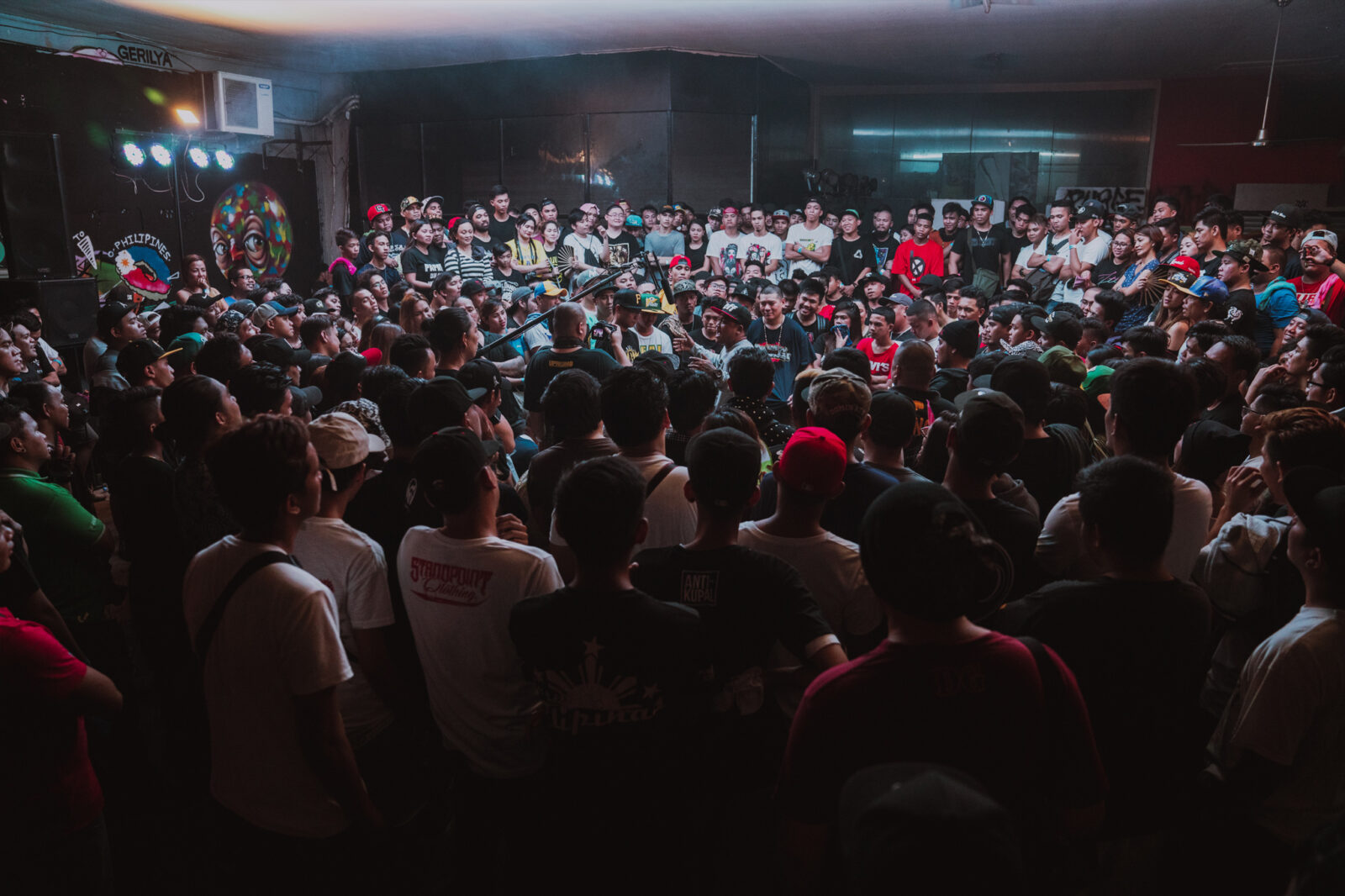
Nina Sandejas
It’s not just about the amount of views that FlipTop has that cemented its place in the country, and by extent, the world. There are numerous battle rappers who have received national and international recognition: think of household names like Loonie, Abra, Shehyee, Smugglaz, Dello, Zaito, BLKD, or those who have worked with Grammy-award winning producer Illmind like Mhot, Jon Protege, and the list goes on and on.
However, despite the recognition, accolades, and popularity of FlipTop and hip-hop in the country, many still look down on the community, resorting to calling it a low-brow art form.
“A lot still do look down on hip-hop and battle rap in FlipTop. You don’t really have to look far. But this is a long-accepted and still-combated reality of our genre and culture as it really is prone to any and every misconception,” shares FlipTop founder and CEO Alaric Yuson, better known as Anygma.
Whether it’s in America or the Philippines, hip-hop has always been the music of the streets. It’s accessible, and you don’t need anything in order to get started. “This is exactly the case with the genesis and evolution of hip-hop as a musical genre wherein it served as an alternative for some inner city youth that could not afford other musical instruments and formal training, but still wanted to be heard.”
Today, it’s clear that the DIY spirit of hip-hop is alive and well. With battle rap in particular, everything is DIY. MCs think of their own punchlines, hits, and rhyming conventions to turn them into bars. It’s not just the technical know-how that makes you win a battle; with FlipTop, you have to win the crowd. The most memorable ones are those deemed by many as “classics,” and no matter how long it’s been since the battle was held, people can immediately recall what these battles were like.
You have the likes of the Loonie-Abra versus Shehyee-Smugglaz battle held during the Dos Por Dos Tournament, almost 11 years ago. The list goes on: Shehyee versus Sinio, Loonie versus Aklas, Dello versus Zaito, BLKD versus Aklas, and so on and so forth. The reason that these battles are called classics is more than what happens in the battle itself.
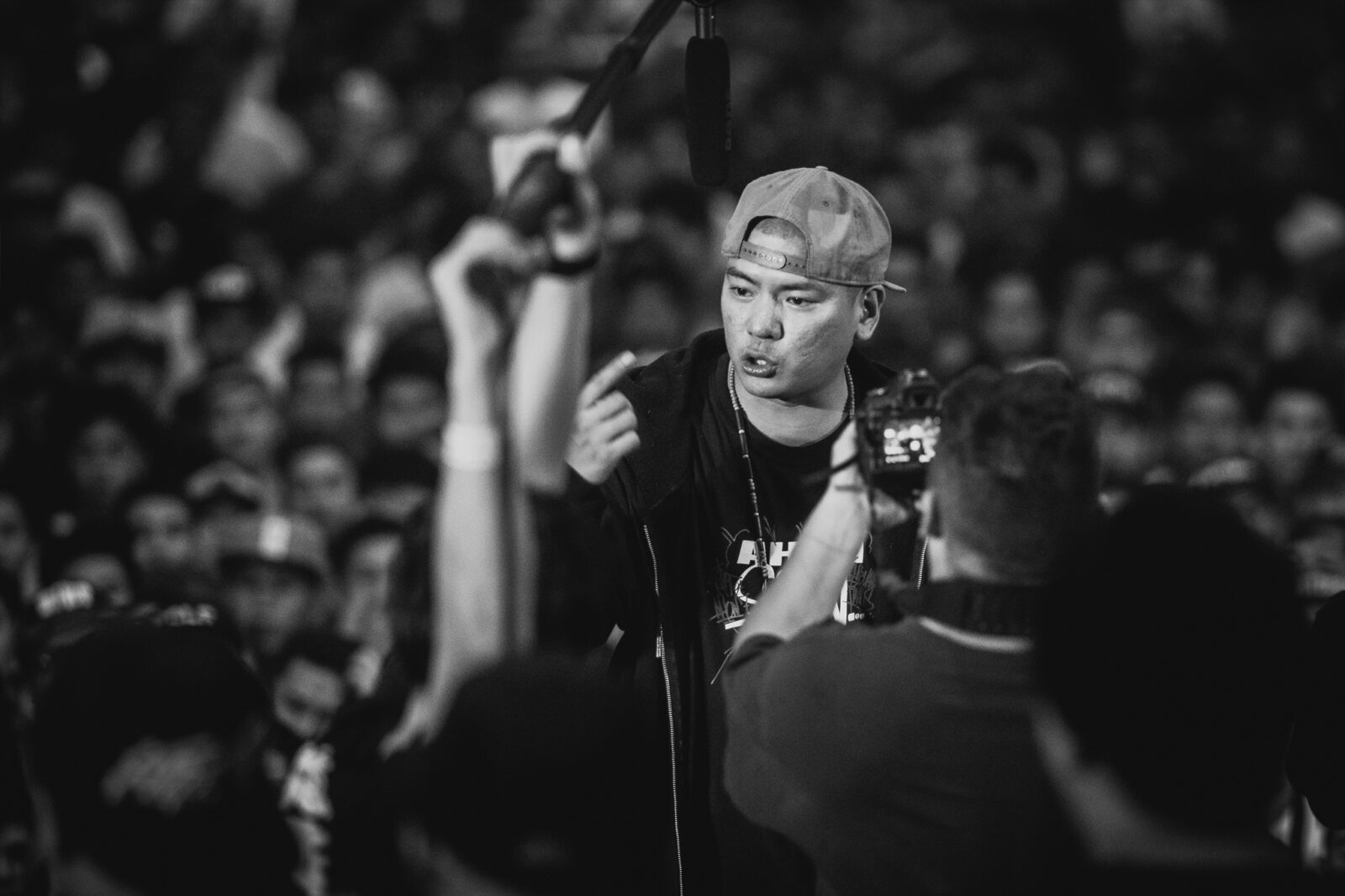
Nina Sandejas
“It takes two to tango. Same goes for making a ‘classic’ battle,” Anygma shares, when asked about what makes a “classic FlipTop battle.” “Fans definitely will almost always enjoy hard-earned levels of competition over one-sided matches. But besides equally matched high levels of skill, there are definitely many nuances that also lead to making a ‘classic.’ Narratives and storylines like in a tournament setting can help prop up anticipation for certain matches.”
“And if the battle delivers and exceeds expectations, then there is a sort of effect of the anticipation paying off more than it would with a regular battle. Sometimes, actual dislike and disputes between participants also result in a more heated battle. Sometimes, it’s also the one-upmanship of particular techniques, be it speed rapping, variety in flows, who’s funnier, who’s more technical, people also like to see who can out-do who, at what.”
Viewership isn’t the main basis for Anygma’s definition of a “classic battle,” as there are many battles that he calls underrated, just because they don’t get the same mileage as more popular examples. However, if anything, that shows the magic of FlipTop — with so many battles, so many different people around the country, and the unique backgrounds of each MC, every battle is fundamentally different.
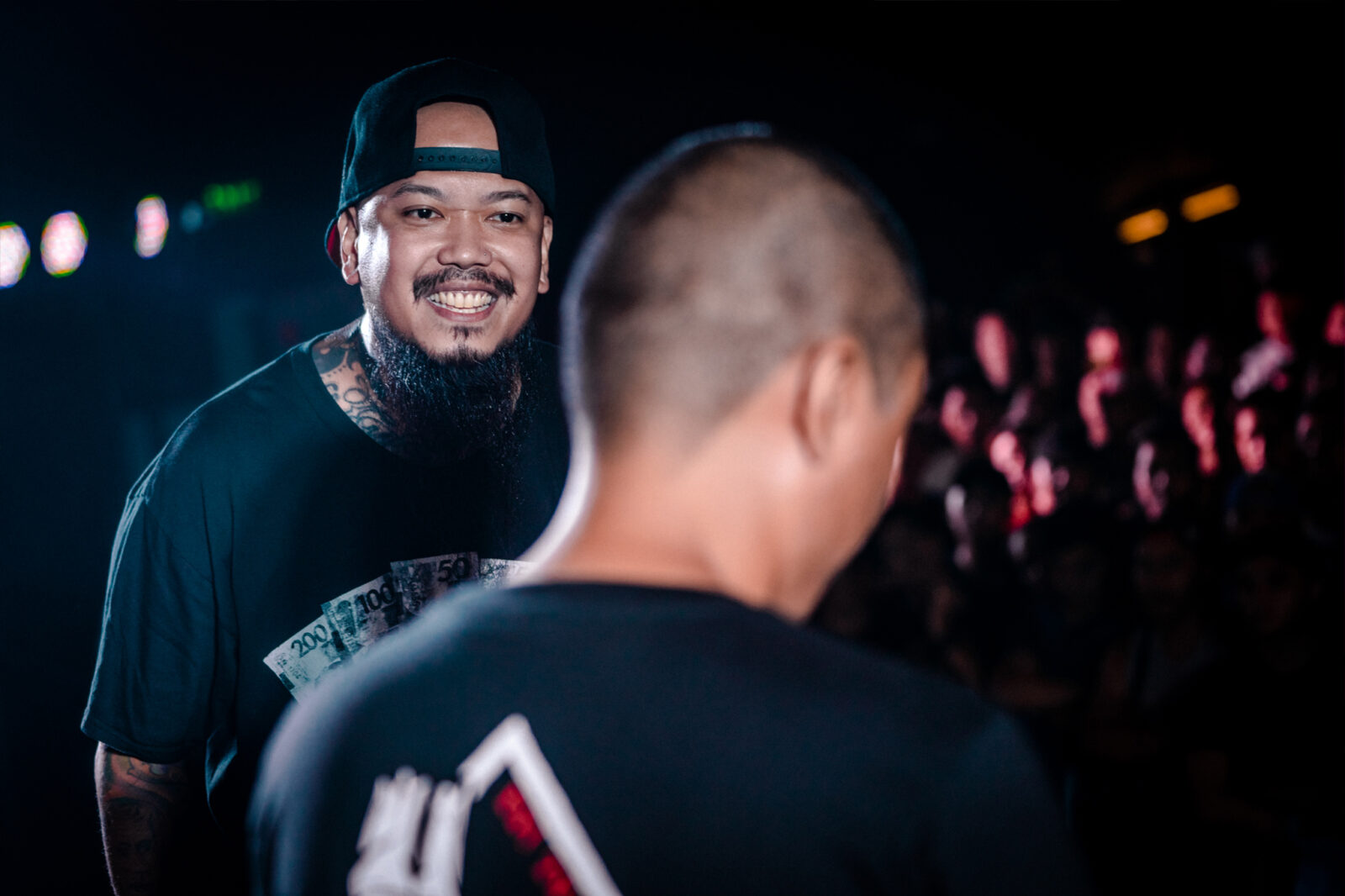
Nina Sandejas
In a match, you can’t just be one note. MCs do research on their opponents to assemble enough ammo to bring down their opponents. In one battle, Loonie-Abra versus Shehyee-Smugglaz, Shehyee and Smugglaz open the battle by mercilessly latching onto Abra’s wealthy background and Loonie’s Bisaya roots.
“Isang mayaman na gustong sumikat / Sikat na gustong yumaman [A rich guy that wants to get famous / Someone famous who wants to get rich] — give and take!”
And then comes the kicker: “‘Wag ka masyadong maligaya diyan, dodong / Ganyan talaga ang mga mayayaman, hindi kayo sumulong kung walang Bisayang katulong! [Don’t be so cocky, dodong / That’s how the rich are, you won’t get far without a Bisaya helper!]”
Of course, most of the time, it’s nothing personal. In February of this year, the four sat down together on Loonie’s rap review series, where they revisited and analyzed their battle after all these years. After Shehyee spat that line, Loonie had only one thing to say.
“Noong nag-register ‘yun sa utak ko, sabi ko, ‘we’re in trouble,’ kasi wala kaming ganyang linya. Wala kaming ganyang…ka-layered. Lahat ng atake namin, puro straightforward rap, multis, rapid fire…kumbaga kung anong madaling gawin.”
[When it finally registered in my head, I said, ‘we’re in trouble,’ because we didn’t have a line like that. We didn’t have those layers. All of our attacks were all straightforward rap, multis, rapid fire…in other words, whatever was easy to do.]
Here, Loonie captures the art form of FlipTop. Some of the most iconic battles and lines are those that find that perfect balance of cultural nuance, humor, wit, and rhyme — even if they tackle topics that seem to come from out of left field. One of which are the social realities in the country, with MCs like BLKD, Apoc, and more not being afraid to directly confront injustices.
When asked what makes hip-hop and battle rap unique in how it handles these sensitive issues, Anygma says that because hip-hop is a verbally-oriented genre, it has all the space and lack of limitations to be able to really nitpick at social issues.
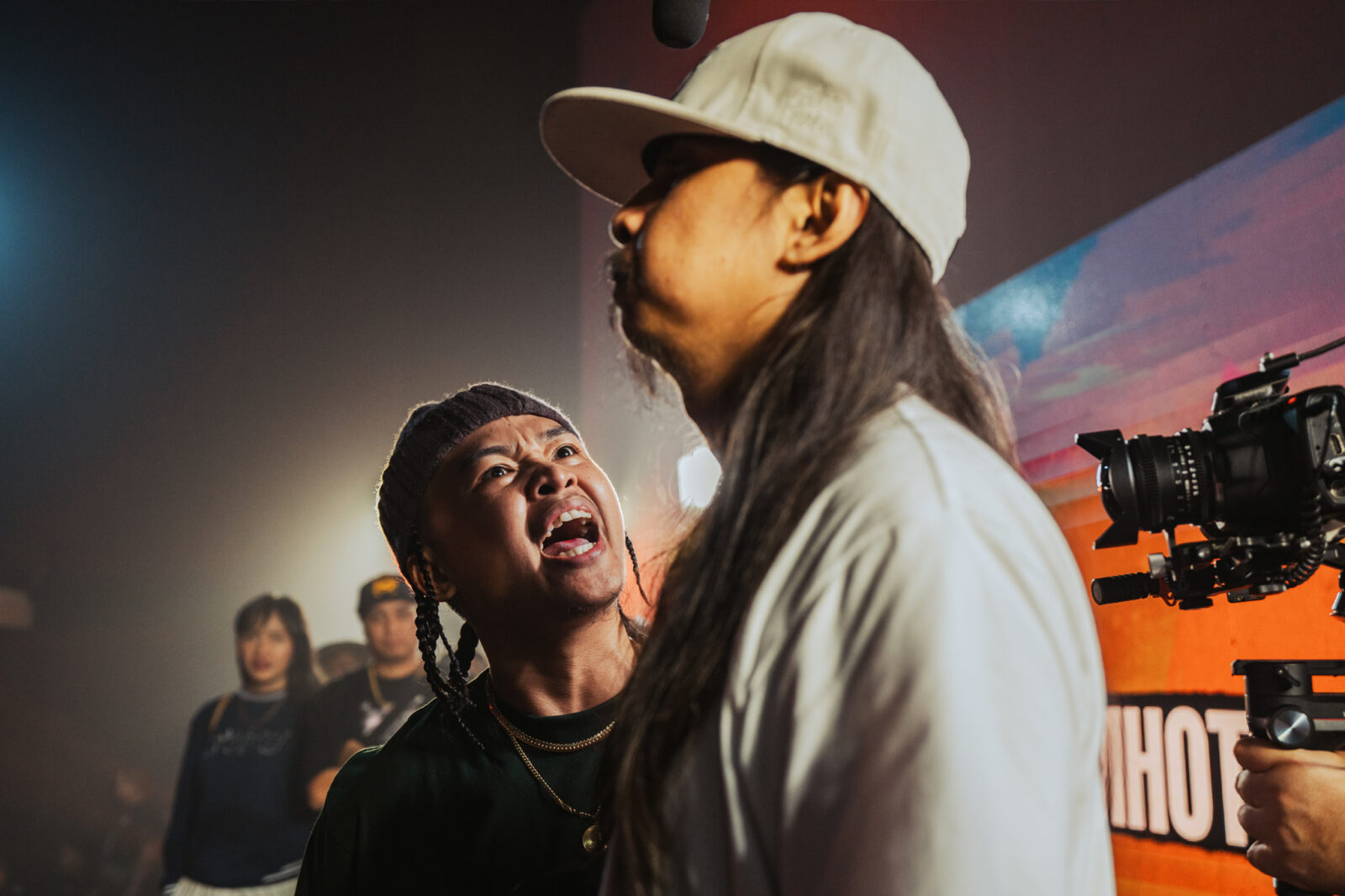
Nina Sandejas
“For example, song arrangement in hip-hop doesn’t require one to fit social issues into shorter verses, melodies, or strict literary standards. One can really enumerate, even un-poetically, problems from the everyday level up to the systemic level and beyond,” he says. “[With it] being a form of struggle music and rebel music, artists are really able to voice out against the powers that be that shape their environments, and ultimately to express yearning for improvement whether politically or morally.”
Take for example the 2014 Isabuhay Tournament Finals, where among other things, BLKD and Aklas go toe-to-toe about BLKD’s activism and critiquing social realities.
“Karamihan sa mga tibak / mga hindi nag-iisip ‘yan / Kung ano ‘yung tinuro ng kanilang lider / Sila namang paniniwalaan / Para lang kayo mga blankong papel / Madaling sulatan! [A lot of activists / Don’t think / Whatever their leader spits out / They just eat it up / You’re all just like blank pieces of paper / Easy to write on!]” Aklas shouts in his signature aggressive style.
Later, BLKD responds: “Pareho lang tayo mulat, na ang mali ay ang mismong sistema, at sistema mismo / Ang sagot ko dito, aktibismo / Ang sagot mo, eskapismo! [We’re both aware that what’s wrong is the system, and the system itself / My answer is activism / Your answer is escapism!]”
Nearly 15 years since its inception, FlipTop has become inseparable with the Filipino hip-hop identity. The two are never just parallel streams, but they interact and shape each other in ways that push the culture even further.
“Hip-hop music, battle rap, and art in general is, as the word implies, a ‘re-presentation’ of life,” Anygma says. Hip-hop and FlipTop is community. And for many, it’s life. Hip-hop is unafraid — always willing to get up close and personal not just with fellow MCs or artists, but also the world at large. It’s brother- and sisterhood, full of people who fight against the odds and make space for themselves — whether other people like it or not.
This story originally appeared in the hip-hop issue of Billboard Philippines, dated April 15, 2024.
